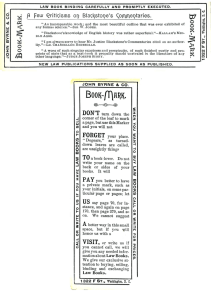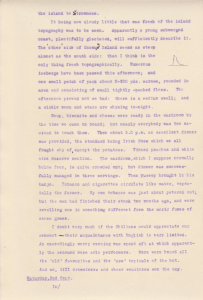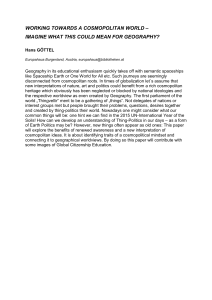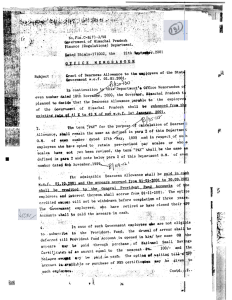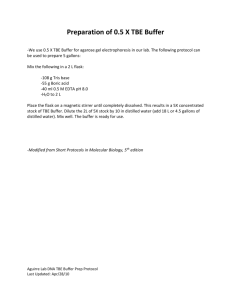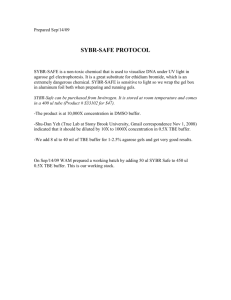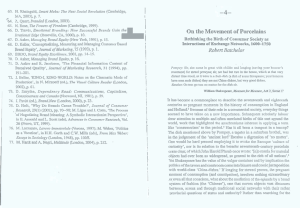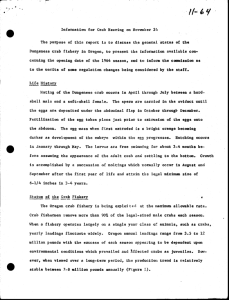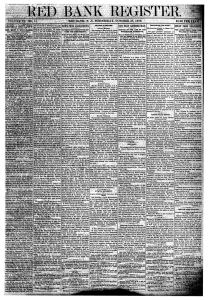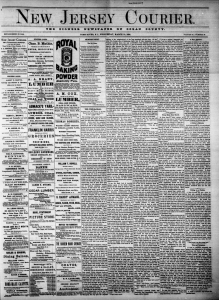Document 13367410
advertisement
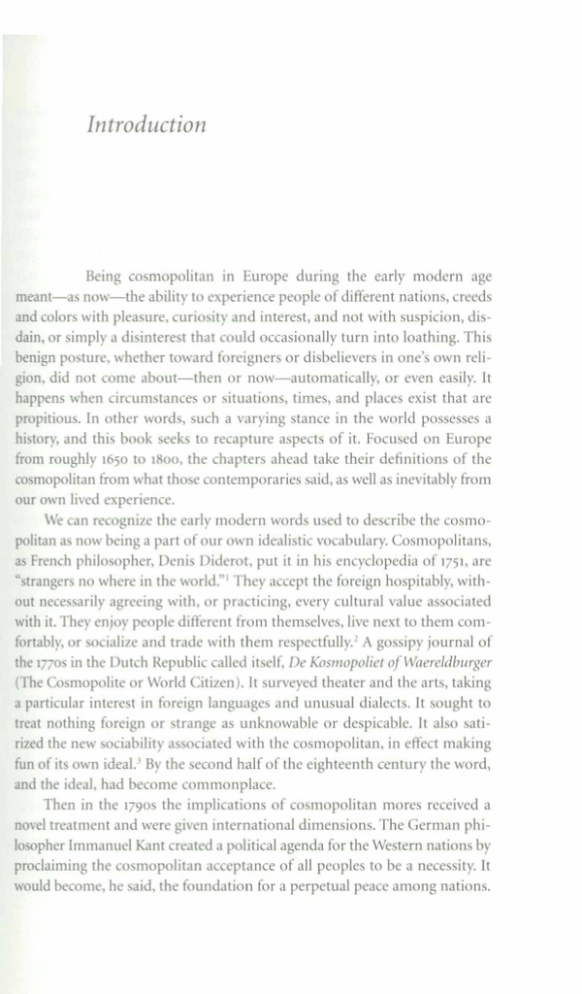
And he saw haspitaiity toward ~lrmger~ as the tell-& sign of ~o8map.1;m W o r . h the m m d e d c other, mnynous, writers @atad for political reform at home and a* the British Intbe voice of "thecosm~palite."~ Their writin@ farcefully associaxed ccrsmbplim values with the Impulse for politid r&m. As we &all see in the c h a p a h 4 they were right to see the linkage, to assert that certain political conditiom-Ion8 associated with democratic repubfia-made cosmopolitan mores happen more ady. 3 y b 17gos a century ofe x p i m a t i n g with constitutional systems of govm a ia Britaia, and the grawiag diation on the Continent that mom&al abso1utism b m e d to Mure, made rosmopdites certain that ~ , a o d t h e r ~ ~ m t h a t ~ t b e n p r ~ ~ ~ i t ~ i o t h e' ess.In socktities where natio& p ~ u r e mounted g by the year and wadti soon f e d to the &pol& Wars,a few visionaries longed to trmxend tho% prohnnd xiwlrie& ' T am not suggesting an early, until now unnoticed histo7 of the abilitp to think about other people e h q p a p h i d l y I am not w i h g us to pretend that the same Eumpeaos who could on wasion mix amicably at 1 hame with the foreign or dream of perpetual peace did not a h practice the i &ve trade abmd But I am saying that in certain early m a k n cirdes and settings, wil31 motives that cauld mge &om millenarian Protestanth to the desire for pro& some EUKlpeans approached thaw W c t l y difkent hthemdves hospitably, with a willingness to get to know &em, even to , ~ t h e m . F r o m a t l ~ ~ s ~ t h m ~ s z l c h a a e x p a ~ l ~1 termed a w m ~ p best o ~defined as a citizen of the world Vagaries will bps surround the word, and dlwe can do is pmvide a E a v ~ ~ a b i ~ ~ . E r o m i & o m i 8 o o ~ ~ h ~ ~ o f u l m d q and human r e j ~ wmetinm ~ , through m and dd~emy, sip4themielm " ~ p o l i t e P 0 t b m w h de&d o the ~~t of minority~ns,inonecasethe~eof~&pi.a~tQd~tbew of mhghn, shielded their identity under the anonymous M,mm~pblite.~ As early as the lQos in English, tho msmopolitm c a m to mean someone who iseutified beyond the nation. At the same m o m in French, he msmopdite ofiandedtg. a p p m EM a "habid of ali the w~dd," All these wordsmiths probably had Memt causes and agendas in min4 @dart0 their moment. They did,hvever, bqueah to us a usdid vocabulary. Their oppaents, ever watchhi, imv the imphtbzts and Brew them out to the mmne. Tbey said that wsmogolites could not identify with their country and cwld not be good ~~" Now,early in wr new century, we reject the inherit.k g a n h s af 1 M r s , midWits, mom h m the quotidian long p s b that mag elk imght intothe chm&mwi that made tbc cosmopoli~sometimes more, otber times h psi'ble. Sometimes mntempomy spied what the of the historian and used the terms *amnopolitatfor m ~ ~ p o I i t e to all amtion to what t h y were doing, or h t i u g . Alchemists were p t i d a r f y hnd of iavoacing the term, of a d n g any border in of their i h h e treasures. But even &en sodo not m iR a h the word, this book Iaels as com~pohn sodal p m that others at the time may not have called by that name. B @ n q in a small southern French city, Avipon, the chapters ahead classify mme behavior from the pa&-in the hence of a better term-as cosmopolitan, Avignon 6 d t d that opportunityh u s e tbe ciqs derid magistraw, representatks of the Inquisition, found certain&it mixing of Gbrihns and ha,Protestants and Catholics, or the b e g of daag h~ u m @ k that they left rich ~W;DICIS of their &rts to stop tfrem.k h a p s thc tcnns "mmoplitansor " ~ o p o l i a estre * best &stood within the sming d q x t e d in the o p i n g chapter. Tbt d d i h t i o n s of the Roman Catholic Inquisition sought to i m p a dear a l t e r ~ b the majority report in some p h a s - h t placed subjects bebind the barrierrp erected by confessional loyalty, or dplace, or national identity. The dcfemks of orthodoxy and the power of c h h and kings thought that border amsing might h a t e n their authority. They believed that opposition politics a d d arise more easily h e n social cxpahce spillcd beyond tbe confines of confkdonal community, or kith md kin. They had been right to worry. Bs the final chapter win show, by the l m a cosmopolitan d k t did indeed knit together the many participants who made up a growing, in-onal and republicana m t i o n J3 @cd trouble for em* moand their states or colonies throughuut the Atlantic d d . In if90 French revolutionaries stormed into A w n , and the new NationalAswmbiy in Paris haUy incorporatedit into the Frrrmch mte.Then future generations forgot about what M g m n had k e n like (and by impiid o n what F a c e might haw been like if left) under the c o n d of the Roman Catholic Inquisition. From the Middle Ages until 1790 it had governed the city md some surrounding territory for reasons that had to do with events centuries earlier in, the history of the paltaving records in this southem pmviodalsetting, these musty anti-amiop0J.hmight haw k e n m a just as we might ignore tb& many early m d m ootmtmpki who once held or aspired to pwr. An older historiography about eady modem Europe, written after M d ps~~tthat~berewctumwem.etfiaic,rada and TZnguiak dmmhy. One theorist h h d in tbe oagoing d k m k m ammd c a s m o h ~i ~ large citics cmywhere in the world as n o w ~ Y m u l t i ~ e d [that] a m areharbmgeraofnew6acsof citknship.. no longer b a d t p n e d u k a t w h e n & to a . ~~ WWry,d~PNWt=the~ofthisnewidmtityin~q- d 9 y d~ns,inthc~orworkpkordinnatabteso LodiAopks, t o n a m e a f a m i l i a r ~ g t o t b i s a ~ . W h i Z t he e a m a h eIsofmdandethnicdivmity~beun~acdintheurbanW r i s i q to the chaUeqe p ~ t byddhmiity a d emmanuplitan mores, hss a pst, H m m will examine eridcnce of bchwhrsr mores and practices we may k&~timateIy label (sometimesowaat la &re), m m o p l h . F i r s t ~ w f i l on ~ sthe mhgbqof Chrishsrrrrd Jquktmts and commoners in Avigmn. We will thtn mow on to examine the asmoplimn impktions b u d h the dubbii of genteel and natwaks h i l y didling plants or making air pump. Next the book twns t o t h e j o s t h g o f ~ i u ~ d ~ ~ m EtH.ope, searching &ways fbr the conditions that made those moments hosp M e and not contentbus. Then we will turn to the ritual frakmhbg of m a ~ ~ n i c * b r o ~ ~ i n ~ c p , ~ ~ * T h e ~ been 4 with the inculcation of m s m q m h m o m We m t to know what truth lies in the claim. We will end with liberal P r o ~ t and s rep~~~Ofthel~as,youngradicalswftotho~t could r m a k the world, and in the prim^ i a d the b t h n h All are hcra invoked to unveil practi#s that lay at the ori&s o f e , W k t e m comnqm~rn,Althoughit~~~an~tediddlarg d k 1754 the &d demothat 8nttdak h U ~ m ~ i t m o r e ~ ~ b y l a t e ~ m t h - c m phT h t ~ j a s t f i n g , ~ i n g , a n d f r s ~ k ~ o o a s ~situations~wgty-~,psopkbchavedinrdotive weys. Ta male such a hip statanent a b n t how q m m k i y d y modern -peanu on &n a u l d act toHlaxd one a m t k , t w a d mangm and tordeaers,requim a & d o n in thinking about rtspeets of Eum pean history. It a& that we briefly take our 08the rise of the national - ~ ~ o f f t h e ~ ~ ~ o n s ~ ~ t h e i r ~ ~ r i ; P e see asmoplitan momin ~ a t t b e ~ t i m b : ta sh e e o n t p in a few p h but therc, non&e%s. Each c h a p o h studies as they are known in the freedom sometimes d d to be the essence of corn& pohtusm pradced on their busy floors may be d- life. The manoas real but h g - ik,hprdwonodysrfterdeEsdesofpractkWhenerra~~fmctiuned under regulations imposed by an absolutist state, be it S p d or hash, thdr open practices were also more m i l y put into retmt. A walk on the floor of early modern &ga makes visible, but 4the amqmhtanismp~ed~beingthereby~md~&. After ipo, genteel and curious se&m did not nttd to be scientik or a k h d d whea they swrchad to h d e n their dhorizons. A new cult d and i n t d d tone had merged among tht edllcated. Profoundly related to and pr&lyatad by thc cosmopolitan k i w i o r hcrc Bcscribtd, the Mighmment rested on new &at gatherings molutdy apart h m the co~dthe~~~htani~~~Chapar4stslrninesontofth txt and most exotic foruas ofaghkmth-tury &ability. We bavc surivsd at the ~ n i moment. c Wtgenttt-centurya(lies of the new scien-iy in its Newtonian &of haw o h had their earmies b r n thc -th cerrtury onward. No one in tbe twentieth century h a d than more than the Nazk French archives recently m a d from M Russian army took~in~~~fnrmthc~who~stulenthmrin Iight on how to read the d h i t s and p c r m k i o ~that ~ ~fmmwnry ~ i t s ~ m e m b e m W E e t h e ~ p u b l s c ~ t h e v p r i v a t c d & M b y ~ s h a w e d ~ l i m i m p h b y ~insome~dnotinothefs.~ttmeyso~tbyruledim constitutions to turn lm$p of r e h k strangers inta sodety and government in midatare. But when strmgm assembled ia order to b$lsveas"b&* 3 ISU~S ' became hught, and the t m h m seen in other sites of mmopditanmores ~ ~ ~ . k n i C l o d g e s ~ a r n e r ~ s t b intotheirin~urbane,butprivsrteworld.Wewill~thed&ailed of o m Mgc in Bordeaux, where the agonizbg hf membershy continued thughout the tightem& century, and where-at least when it to the aaminairm of Jws-tbe comoptrlitaa impulse Mterd A ladge thatMddd~cmughtobecom~ofEngIishandFrench d a n t s muggl-mat suuw-b be even more open. Iadges in London and Amtdm admitted Jews.Yet meeting privatdy, ewa *, bonded by s h a d d internationally h m rituals, the Ckristiao*brothers" of B d a u x , ahhou& thernaeh.es h r n diffmnt d o n s , a d d not bring them&es to embrace Jewish members, wen visitors. - - f atbWma. WQa 1 9 r n and j~ sbwt ~ r ~ ~ ~ h a n d - ) M b e e n ~ ~ o f t b e ~ ~ i n ~ain$ttr.~prner4wZa~withWre#r~ p W ~ t o h i b m 0 f ~ ~ p~~~~~~ ~ ~ S m J l ~ f 08tiodb~~mtindym@daad ~ e o o l t t ~ o t T h t m m o ~ ~ p ~ m a t m a d ~ h ~ 0 tqm thceacrgmccpfcoamopolitanmo~ * ~ e ~ ~ u t C ~ o f ~ tm=qg%hd-Rrt&wey,ofmsnwphnq e r h d b y a w i d e ranged w c ~ ~ ~ ~ 6 M * * h t t w ~ r m # d ~ i ~ ~ ~ f i r 8 t ~ t in the ~m then in the lateq8m aaingnpbds k In- - the concfusion that urgent change was A8bset of awmp tions, vocabdarhs, and qxriences, identifiably mmopozitan and present for a century or mare, made the intmmliond republican conversation hap pen more easily. For the #fords *all men are created equal" to hare any substantial meaning, peopk then and now, have to w r i w c e the foreign or the Imfamiliar, be be by how radially different other people can bt,and yet decide that aome unived smemmts arc still applicable. If humanldad is to respond to kua of tyranny, or ethic and rdqious hatrad, then histoy~thatsomahinglikeaa~~hn~~IPthatis rqated I d understanding of om's a o m e c m h ~ to the whole" is requiredigIn the chapters ahead we find cmunpk of how,out of lived eqericnce, such a consciousness may have taken shape within early m&ty in the West.Something, some mmpclling Wt,oftcn of a commercial or mscmtly scientific or inmturc, called for border c m x i q for mingling in coteriesoutside of conpption, kith and kin, uItimately a a m national bordersmm FitfuUy, the mingling led to t b k h g , and wticdathg, the msmopoli~ani d 4 now seen as r mainstay of liiral and toIerant d a l experience, a goal for peoples everywhere.
